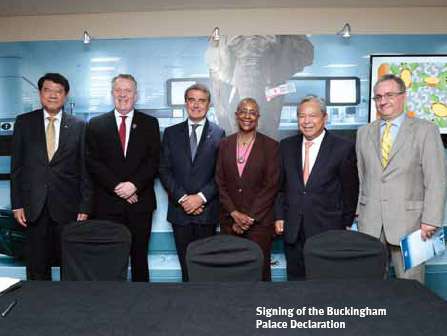CANCUN is a beautiful destination where people travel to celebrate honeymoon, marriage anniversaries or relax during summer vacations, but the International Air Transport Association (IATA) decided to hold its 73rd Annual General Meeting (AGM) to deliberate the challenges of the aviation industry for two days in the hot summer of June. The way leaders of aviation industry appear to be worried on the challenges and squeezing of profit, it appears they want the political leadership of the world to understand the enormity of the lifeline of the society. The aviation leaders appeared to be perturbed by some sudden announcements of reckless legislations by the respective nations even without consulting or informing the aviation industry, which has a size of $2.7 trillion of economic activity and delivers a third of global trade.
The 73rd IATA AGM and World Air Transport Summit present a glimpse of the World Air Trade and indicate how the economy of the world will progress. IATA’s Director-General and CEO, Alexandre de Juniac, in his inaugural speech was forthright in pointing out the issues concerning the industry. The first order of business was electing Aeroméxico CEO, Andres Conesa, as President of the AGM. The IATA announced that Goh Choon Phong, CEO of Singapore Airlines, will be the new Chairman of the IATA Board of Governors (BoG) for a one-year term, effective from the conclusion of the 73rd IATA Annual General Meeting (AGM) in Cancun. Goh is the 76th Chair of the IATA BoG, and the third CEO of Singapore Airlines to hold this position.
The IATA organised a panel discussion on ‘The end of globalisation? What would this mean for us?’ The panelists were Tina Fordham, Managing Director, Chief Global Political Analyst, Citi Research, Emilio Romano, President and CEO, Bank of America Merrill Lynch, Mexico, Simon Evenett, Academic Director MBA Programs, University of St Gallen, Switzerland and Ann Pettifor, Director of Policy Research in Macroeconomics, PRIME Economics. Everybody was surprised to know the views in which they expressed that for most of the past 25 years, globalisation has been regarded as an unstoppable juggernaut. But today, there is a palpable uncertainty about the state of our world, with many commentators suggesting that this juggernaut may finally come to a halt.
Aviation industry—Factfile
- Passenger demand is expected to grow by 7.4% over the course of 2017. That is the same growth rate as 2016 and 2.3 percentage points higher than previously forecast. Stronger demand translates into an additional 275 million passengers (over 2016), which will bring the total number of passengers expected to fly this year to 4.1 billion.
- Cargo demand is expected to grow by 7.5% in 2017. That is more than double the 3.6% growth realised in 2016 and 4 percentage points above the previous forecast for this year. Total cargo carried is expected to reach 58.2 million tonnes. This is higher than previously forecast (by 2.5 million tonnes) and 3.9 million tonnes over 2016 levels.
Costs
Cost increases for fuel, labour and maintenance accelerated in the first quarter. Overall industry expenses are expected to rise to $687 billion, a $44 billion increase on 2016. Industry revenues are expected to increase to $743 billion, $38 billion more than 2016.
- Cheaper fuel was responsible for most of the 8% fall in airlines’ unit costs in 2016, but that impact is coming to an end due to the influence of fuel hedges and rising spot prices. Some regions will still see some modest benefits from hedges but this will be insufficient to offset the rise of other operating costs. The total industry fuel bill is predicted to be $129 billion, slightly below the 2016 level of $133 billion, and accounting for 18.8% of the industry’s total costs. The forecast anticipates an average oil price of $54/barrel for Brent Crude (up from $44.6/barrel in 2016 but close to current levels) reflecting a broad balance between OPEC supply cuts and new supply from US shale oil producers. That will lead to jet kerosene prices averaging $64/barrel this year.
- Aside from the effect of fuel prices and hedging, the main driver of increased costs this year is coming from labour and industry suppliers which are exerting pressure for an increased share of the airline industry’s improved financial performance. Last year, productivity gains offset wage increases, but this year we expect unit labour costs to rise by almost 3%,, continuing what has already been evident in the first quarter.
Yields
Yields are still expected to be down on 2016 levels, but there are signs of stabilisation in the first half of the year with a slight improvement anticipated towards year-end, driven by better capacity utilisation and the imperative to respond to the rise of unit costs.
- Passenger yields are expected to fall by 2% over the course of the year. This is the smallest decrease in recent years (-8.8% in 2016, -11.9% in 2015, -5.5% in 2014, -3.9% in 2013).
- Cargo yields are expected to fall by 1% over the course of the year. This is also the smallest decrease in recent years (-12.5% in 2016, -17.4% in 2015, -2% in 2014, -4.9% in 2013).
ANOTHER interesting panel discussion was on ‘Disruptive Innovation’, which has created new markets and a high value network. But what disruptive innovations have helped to maintain that network? Tripadvisor, for instance, started with an idea conceived in a little room above a pizza shop and involved how to connect consumers directly to the travel process. Today about 400 million people visit the site per month. Innovation needs open mindedness, creativity and flexibility, the panel members agreed. According to Christoph Mueller, chief digital and innovation officer at Emirates, disruption in the airline industry is not necessarily coming from other airlines, but rather from other industries. In his view, the airline industry is about to have to compete with companies like Apple and Spotify. “The real user experience consumers want is the wake-up call the airline industry is facing,” explained Mueller. In his view, the airlines that will survive will be the ones making their business model more customer-based in the way of adding to the value chain. Yet, one of the challenges for airlines, when it comes to innovation, is its lack of agility in this regard.
ANOTHER member of the panel was Jeremy Wertheimer, founder of ITA Software, which is now a travel industry software division of Google. “When the stakes are raised and it should be as easy as buying something with your thumb print, the airline industry is often limited by the intermediary system that has been its way of doing things for a long time,” said Wertheimer.
“Now, as new entrants and new industries are entering the travel space, consumers increasingly want an airline to be a partner in their trip, communicating with them all along the trip. There lies tremendous opportunity in this area.”
Key indicators
Some key indicators of the strength of global connectivity include:
- The 2017 average return airfare is expected to be $35, which is 64% below 1996 levels after adjusting for inflation.
- Average air freight rates in 2017 are expected to be $1.51/kg, which is a 69% fall on 1996 levels.
- Air cargo accounts for around 35% of the total value of goods traded globally.
- The number of unique city pairs served by aviation is forecast to grow to 19,699 in 2017, a 99% increase on 1996.
- The global spend on tourism enabled by air transport is expected to grow by 5.2% in 2017 to $685 billion.
- Airlines are expected to take delivery of some 1,850 new aircraft in 2017, around half of which will replace older and less fuel-efficient aircraft. This will expand the global commercial fleet by 3.8% to 28,645.
Entrepreneur Gillian Morris, founder of travel app Hitlist, foresees that the introduction of driverless cars would make consumers even favour such a mode of transport—like a driverless Uber taxi instead of flight journeys of under five hours and thus avoiding airport security, not being able to take a laptop and other perceived inconveniences they associate with taking a flight.
According to Wertheimer, airlines have to look at their customers more closely and integrate information more tightly. Yet, there seems to be a kind of disconnect from consumers and changes happening in the industry. The consumer must actually want what you are trying to give them.
IATA adopted a resolution to accelerate the modernisation and transformation of the air cargo industry. The resolution builds on the momentum created by the entry into force of the World Trade Organisation’s (WTO) Trade Facilitation Agreement (TFA).
 The TFA commits governments to making trade faster, cheaper and more efficient. To ensure that air cargo is ready to benefit from the expected $1 trillion boost in trade growth arising from the TFA and the improving global economic environment, IATA need a major overhaul of industry processes. And there is no time to lose; our customers already expect the efficiency of electronic documentation,” said Alexandre de Juniac.
The TFA commits governments to making trade faster, cheaper and more efficient. To ensure that air cargo is ready to benefit from the expected $1 trillion boost in trade growth arising from the TFA and the improving global economic environment, IATA need a major overhaul of industry processes. And there is no time to lose; our customers already expect the efficiency of electronic documentation,” said Alexandre de Juniac.
ON the proposal to privatise Air India, Alexandre de Juniac, evaded questions while observing that this was the second time such an announcement had been made. Maintaining that “we don’t have a position on that (privatisation)”, de Juniac said, “The government can do whatever they like with the airline, provided they do something which is competitive or competition-oriented. If there is no distortion in the market, it’s okay. Then do it.”
While the IATA has said that the Air India’s privatisation process should not “distort” competitiveness in the aviation market, the Star Alliance, of which Air India is a prime member, has said the ownership and control should not affect its network or lead to the “backdoor entry” of an airline into the grouping. Other important development for India is that Jet Airways chairman, Naresh Goyal, has been re-elected to IATAs Board of Governors. This would be the fifth successive tenure for Goyal at the IATA Board of Governors. There were only two airlines’ representatives from India, Naresh Goyal and Air India’s Pankaj Srivastava, Director Commercial and Board Member. Next year’s AGM will be held in Sydney, Australia.
(gfiles was not hosted by IATA for this article)












































